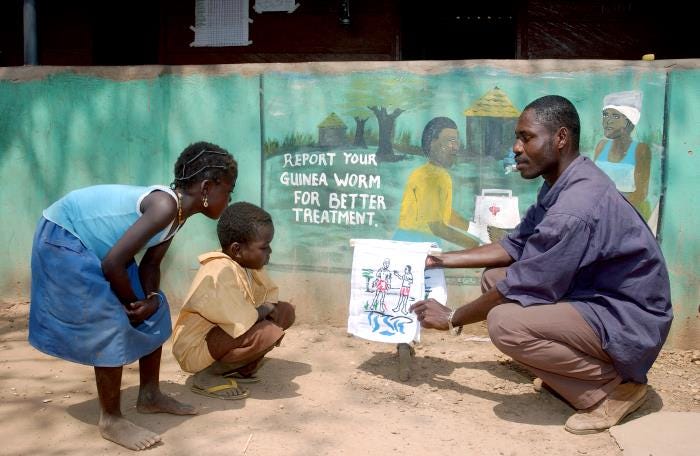
Former President Jimmy Carter passed away today. Many of the tributes you will read in the coming days and weeks will come from his admirers in public health. That’s because President Carter dedicated decades of his post-presidency to advancing global health through The Carter Center, which works to eliminate Guinea worm, river blindness, trachoma, schistosomiasis, lymphatic filariasis, and malaria (among other priorities).
Sometimes, nonprofits have only a thin connection to their namesakes. Not so with The Carter Center. By all accounts, he was deeply involved in his Center’s work. One of my favorite anecdotes dates back to 1995, when President Carter personally negotiated a ceasefire during the Sudanese Civil War so that health workers could advance the Carter Center’s goal of eradicating Guinea worm.
Guinea worm disease is a parasitic infection in which the female worm burrows through the tissue of people infected. The worm eventually emerges out of the skin creating excruciatingly painful sores. Its exit is sometimes hastened by twirling the worm around a stick, evoking the Rod of Asclepius, the symbol used to represent medicine. (Scholars aren’t sure of the rod’s origin. Treatment for Guinea worm is one possibility.) In other cases, people seek relief by soaking in cool water—where the emerging Guinea worm releases its larvae. The cycle continues when others unknowingly drink water contaminated with water fleas that have eaten the larvae.
Preventing transmission is as simple as ensuring people have access to clean drinking water or simple filtration systems (like straw filters) and educating people with Guinea worm disease not to soak in water when the worm is emerging.
The six-month ceasefire that President Carter negotiated—at the time, the longest humanitarian ceasefire in history—allowed health workers to distribute hundreds of thousands of filters to prevent Guinea worm transmission, as well as immunize children against other diseases. It was thanks to President Carter's personal efforts that health workers could access conflict zones and provide those public health services.
President Carter said that it was his sincere hope to outlive the last Guinea worm. His dedication to this cause drove astonishing progress. The number of cases has fallen 99.99%, from an estimated 3.5 million in 1986 to just 7 so far in 2024 (as of Nov 12). Although I am sorry that he did not live to see eradication, I hope his loved ones can take comfort in his extraordinary, lasting impact on public health—not least of which the millions of people who have been spared Guinea worm thanks to his tireless advocacy and resolve.





I cast my first ever vote for President Carter, and have never once regretted that decision. He was a truly good human being who left a legacy of service to the human race. May he rest well -- he's earned it.
Thank you for your tribute to President Carter. He was a remarkable person.